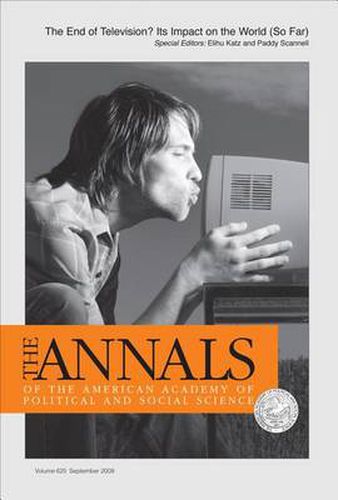Readings Newsletter
Become a Readings Member to make your shopping experience even easier.
Sign in or sign up for free!
You’re not far away from qualifying for FREE standard shipping within Australia
You’ve qualified for FREE standard shipping within Australia
The cart is loading…






Is television dead? The classic television era of the 1950s and 1960s, characterized by limited choices of programs broadcast on over the air channels to families as if they were seated around a hearth - and to a nation as if gathered around a campfire - has indeed ended.
That early stage of sharedness and scarcity gave way to the television of plenty, when satellite and cable and competition reigned, choice was suddenly expanded, and every room in the home had its own television set. And now television offers infinite choices where we can view what we like; when we like; where we like; on a variety of screens, telephones, and Web sites. Some researchers assert that television is not dead but has merely moved from a collectivist to an individualist phase.
Throughout the drastic evolution of this media, thousands of studies have examined the short-term effects of television, such as the evaluation of persuasion campaigns. Yet there is scant research on the overreaching sociological impacts of television and its centrality to Western culture over the past 60 years. This compelling volume of The ANNALS is the first collection of rigorous articles devoted to studying ways in which television has impacted our values, ideologies, institutions, social structure, and culture.
Focusing on classic television, these leading experts in media studies delve into the effects on social institutions (namely family and politics) and its effects on values and everyday behavior. These seminal articles lay the groundwork for innovative studies of the numerous ways that television has impacted democracy; social integration (nation and family); trust and suspiciousness; materialism; and identity (social and physical). Students and researchers will find a wealth of inspiration for new research projects. It is a must-have resource for social scientists interested in media studies.
$9.00 standard shipping within Australia
FREE standard shipping within Australia for orders over $100.00
Express & International shipping calculated at checkout
Is television dead? The classic television era of the 1950s and 1960s, characterized by limited choices of programs broadcast on over the air channels to families as if they were seated around a hearth - and to a nation as if gathered around a campfire - has indeed ended.
That early stage of sharedness and scarcity gave way to the television of plenty, when satellite and cable and competition reigned, choice was suddenly expanded, and every room in the home had its own television set. And now television offers infinite choices where we can view what we like; when we like; where we like; on a variety of screens, telephones, and Web sites. Some researchers assert that television is not dead but has merely moved from a collectivist to an individualist phase.
Throughout the drastic evolution of this media, thousands of studies have examined the short-term effects of television, such as the evaluation of persuasion campaigns. Yet there is scant research on the overreaching sociological impacts of television and its centrality to Western culture over the past 60 years. This compelling volume of The ANNALS is the first collection of rigorous articles devoted to studying ways in which television has impacted our values, ideologies, institutions, social structure, and culture.
Focusing on classic television, these leading experts in media studies delve into the effects on social institutions (namely family and politics) and its effects on values and everyday behavior. These seminal articles lay the groundwork for innovative studies of the numerous ways that television has impacted democracy; social integration (nation and family); trust and suspiciousness; materialism; and identity (social and physical). Students and researchers will find a wealth of inspiration for new research projects. It is a must-have resource for social scientists interested in media studies.